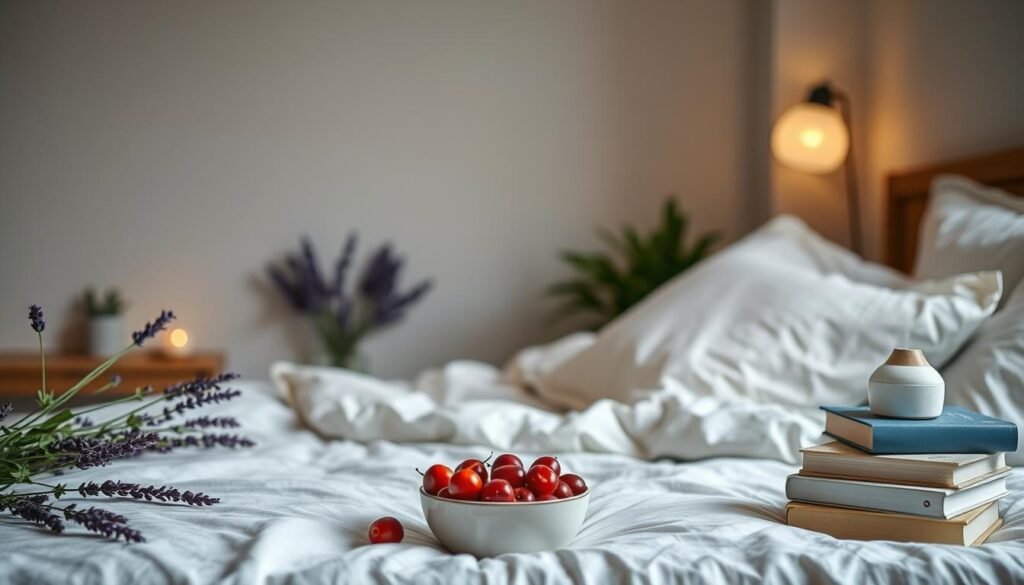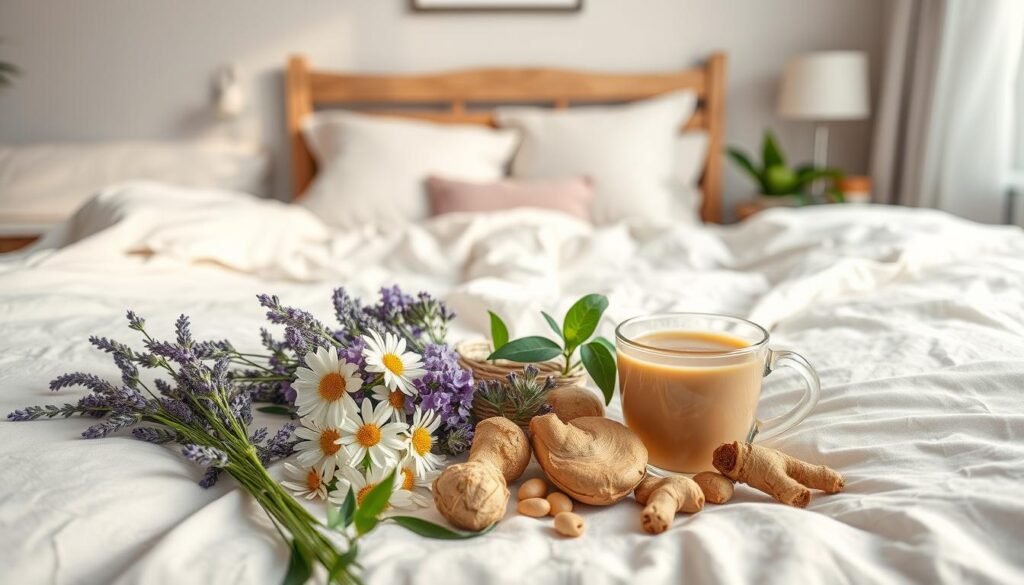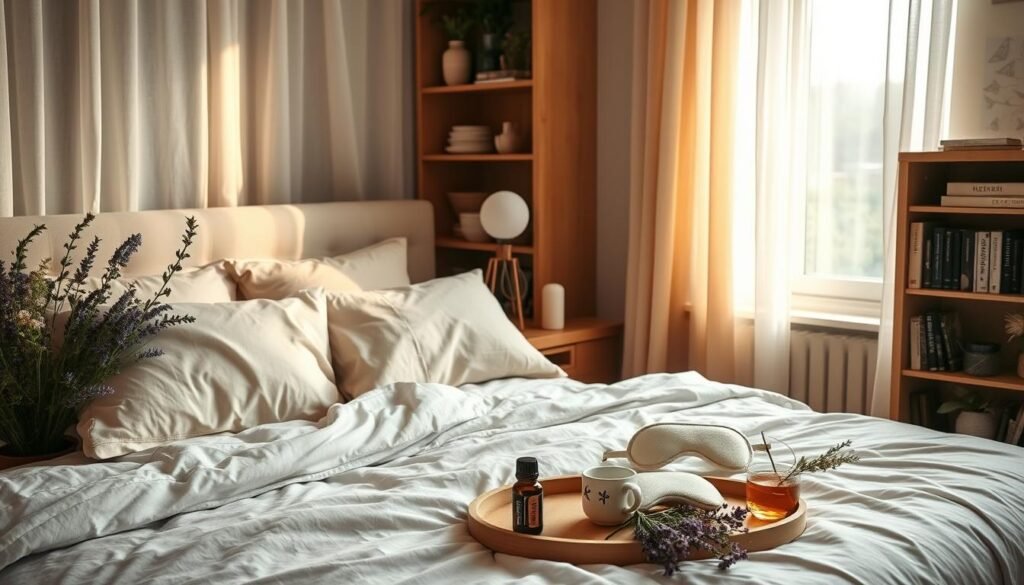Did you know more than 70 million Americans have chronic sleep problems? This shows how common insomnia is, with up to 35% of U.S. adults affected. Those with sleep issues may face serious health risks like obesity, heart problems, and high blood pressure. Dr. Charlene Gamaldo of the Johns Hopkins Center for Sleep says diet and lifestyle changes can help.
Natural sleep aids like warm milk, chamomile tea, and tart cherry juice can improve sleep. By using these 26 home remedies, you can better your sleep without the downsides of drugs. Exploring these remedies will help you sleep better and boost your overall health.
Key Takeaways
- Over 70 million Americans experience chronic sleep issues.
- 35% of adults in the U.S. face occasional insomnia.
- Natural remedies can significantly improve sleep patterns.
- Simple lifestyle changes can offer holistic insomnia treatments.
- Dietary choices play a vital role in sleep quality.
Understanding Insomnia and Its Impact
Many people struggle with insomnia because of different reasons. It’s important to know what causes it. Stress, anxiety, and not-so-good choices in lifestyle, like drinking too much coffee, can mess with sleep.
Common Causes of Insomnia
Knowing why we can’t sleep is the first step to better rest. Here are some things that can keep us awake:
- Stress: It can make our minds race, making it hard to chill before bed.
- Anxiety and Depression: These mental health troubles often mess with our sleep.
- Environmental Factors: Loud noises, too much light, and being too hot or cold can stop us from sleeping.
- Substance Use: Using stuff like caffeine, nicotine, and alcohol can change our sleep patterns.
- Medical Conditions: Chronic pain or hormone changes can also affect our sleep.
Effects of Poor Sleep on Health
The bad effects of not sleeping well go beyond feeling sleepy. Not getting enough rest can hurt our bodies and minds in big ways. Here are some issues it can cause:
| Consequence | Description |
|---|---|
| Mood Disorders | Not sleeping enough can lead to more anxiety and depression. |
| Weight Gain | Bad sleep messes with appetite hormones, which might cause weight gain. |
| Cognitive Impairment | Lack of sleep hurts our memory, decision-making, and brain work. |
| Cardiovascular Issues | Not sleeping well is linked to heart disease and high blood pressure. |
26 Home Remedies for Insomnia
Looking for ways to beat insomnia? There are many home remedies to help you sleep better. These include changing what you eat and how you live. Such changes can make a big impact on getting good sleep.
Natural Sleep Solutions
Adding certain habits can help you sleep better. Working out regularly leads to deeper sleep. Try exercising for thirty minutes, three to four times a week. This will help you fall asleep faster and sleep longer. Exercising in the morning is even better for your sleep.
What you eat matters too. Foods high in tryptophan, like turkey, cheese, and nuts, help make serotonin. This makes falling asleep easier. Try to eat these foods in the evening and stay away from caffeine close to bedtime.
Mindfulness can also fight insomnia. Writing down what you’re grateful for for 15 minutes can ease worries. This makes falling asleep easier. Doing exercises to relax your muscles right before bed can also help you unwind.

Herbal remedies are growing in popularity. Melatonin supplements can reduce the time it takes to fall asleep. Even low doses are effective. Valerian root is another herb that helps with sleep, without many side effects.
If you’re looking for different options, consider passionflower for its calming effects. It can help with sleep and reduce anxiety. When trying these natural remedies, be aware of their safety and side effects. What works varies from person to person.
Herbal Remedies for Better Sleep
Herbal remedies give a natural way to tackle insomnia. Chamomile tea shines for its soothing effects. It’s become well-liked for its potential to ease the mind and might enhance sleep. Chamomile has antioxidants that possibly work with brain receptors to help calm down for a good night’s sleep.

Chamomile Tea Benefits
People enjoy chamomile tea for its mild taste and its calming impact. A cup before bedtime helps relax both body and mind. Though research on chamomile is not exhaustive, it’s thought to lessen anxiety and boost sleep quality.
How Valerian Root Helps
Valerian root has been used for ages to fight insomnia. It’s known to relieve anxiety and help with falling asleep quicker. Yet, it might take several weeks of use to notice improvements. Even with limited proof of its effectiveness, many include it in their sleep betterment plans.
But, it’s crucial to check for any possible side effects. Always consult a healthcare professional before trying new supplements.
Relaxation Techniques for Insomnia
Many adults struggle with insomnia, looking for ways to sleep better. Using relaxation techniques for insomnia has been effective. Techniques like mindfulness and gentle yoga help calm the mind before bed.
Mindfulness Meditation Practices
Mindfulness meditation practices focus on breathing and being in the moment. This reduces stress and anxiety, making it easier to sleep. It calms the brain, especially in areas linked to stress and memory, leading to a peaceful mental state.
Yoga and Deep Breathing Exercises
Yoga for sleep is great, especially restorative yoga. When you add deep breathing, it eases physical tension and calms the mind. Together, they prepare you for a good night’s sleep. Try these methods:
- Progressive muscle relaxation: Tense and relax each muscle group.
- Guided imagery: Picture a calm scene to relax.
- Deep breathing: Slow breaths help you relax.
Being consistent with these techniques improves sleep over time. A nightly routine of mindfulness and relaxation can help beat insomnia. It boosts overall health and wellness, too.
| Technique | Description | Benefits |
|---|---|---|
| Mindfulness Meditation | Focus on breath and present moment | Reduces stress and anxiety; promotes calm |
| Yoga | Gentle stretching and poses | Relieves physical tension; enhances mental clarity |
| Deep Breathing | Slow, controlled breaths | Activates relaxation response; aids in sleep onset |
Alternative Insomnia Cures
People are always looking for new ways to sleep better. Alternative insomnia cures like kava and passionflower are popular. It’s important to know the good and bad about these options.
Kava and Its Risks
Kava is a plant known to help calm you down. It’s a natural choice for fighting insomnia. However, kava can be risky and may harm your liver. That’s why it’s crucial to talk to a doctor before trying kava.
The Role of Passionflower
Passionflower is another option that may help you sleep. It works by calming your nerves, similar to anxiety meds. Although research is ongoing, many people feel it helps them. But, talking to a healthcare provider first is always a good move.

A lot of adults, more than one third, try alternative medicines like kava and passionflower. They often choose these when they have trouble sleeping. Adding lifestyle changes can also improve sleep quality. To learn more about natural remedies, visit this resource. If you’re looking for supplements, see this guide.
Drug-Free Sleep Solutions
Exploring drug-free sleep solutions is very important. It’s for anyone who wants to fight insomnia without using medicine. Melatonin supplements and magnesium help relax and improve sleep quality significantly.
Melatonin Supplements
Melatonin is a hormone our bodies make to control sleep. Many people choose melatonin supplements to sleep better. In fact, almost 2 out of 3 American adults have tried them. These supplements are shown to make falling asleep easier. Drinking sour cherry juice before bed can also increase melatonin naturally.
Magnesium for Relaxation
Magnesium is known to help relax your body. It plays a crucial role in sleep, making it easier to fall asleep by calming the nervous system. Studies show that magnesium might help older adults with insomnia get better sleep. Doing yoga or meditation before bed can also make magnesium work better, leading to deeper sleep.
| Supplement | Benefit | Dosage |
|---|---|---|
| Melatonin | Reduces sleep latency, enhances sleep quality | Typically 0.5 – 5 mg before bedtime |
| Magnesium | Promotes relaxation, regulates sleep processes | 250 – 500 mg, preferably in the evening |
| L-Theanine | Reduces stress, anxiety, improves sleep quality | 100 – 400 mg before bed |
| Valerian | Improves sleep quality | 300 – 600 mg before bedtime |
| Glycine | Improves sleep quality, reduces daytime sleepiness | 3 grams before bed |
Sleep Hygiene Tips
Improving your sleep quality can be easy with the right tips. Having a regular sleep schedule tells your body it’s time to relax. If you go to bed and wake up at consistent times, you’ll feel more rested. This regularity tunes your body’s clock, helping you fall asleep and wake up feeling fresh.
Importance of a Sleep Schedule
A steady sleep schedule is key to good sleep. The National Sleep Foundation says a routine improves sleep quality. Following a fixed schedule makes sleeping easier every night. Relaxing before bed also helps, making falling asleep smoother.
Creating a Sleep-Friendly Environment
To sleep well, your environment matters a lot. Keep noise low and control light to improve your sleep. Aim for a bedroom temperature of 68 to 72 degrees. Use earplugs or white noise machines for quiet. Blackout curtains and less screen time at night help melatonin levels. Lavender scents can make your bedroom a more relaxing place.
Check out sleep tips for more ideas on better sleep hygiene. You can also find natural sleep aids here. By focusing on these tips, you create a great environment for good sleep and health.
Diet and Insomnia
Diet is key in managing insomnia and getting better sleep. Eating certain foods can help your body relax at night. Foods high in tryptophan, like turkey, dairy, and bananas, boost serotonin and melatonin in the brain. These chemicals are crucial for sleep.
Complex carbohydrates, such as whole grains, help tryptophan reach the brain. This makes its sleep-helping effects stronger.
Foods That Promote Sleep
Eating right can really change your sleep. Fatty fish, nuts, and tart cherries are good as they have omega-3 and melatonin. These help you sleep well. Adding these foods to your diet can make your sleep more refreshing.
What to Avoid Before Bedtime
Certain foods and drinks can make sleeping hard. Avoid heavy meals, caffeine, and alcohol before bed. These can keep you awake. Eating late can also make sleeping difficult.
Knowing what to avoid at night can really help your sleep quality. It leads to a better rest.